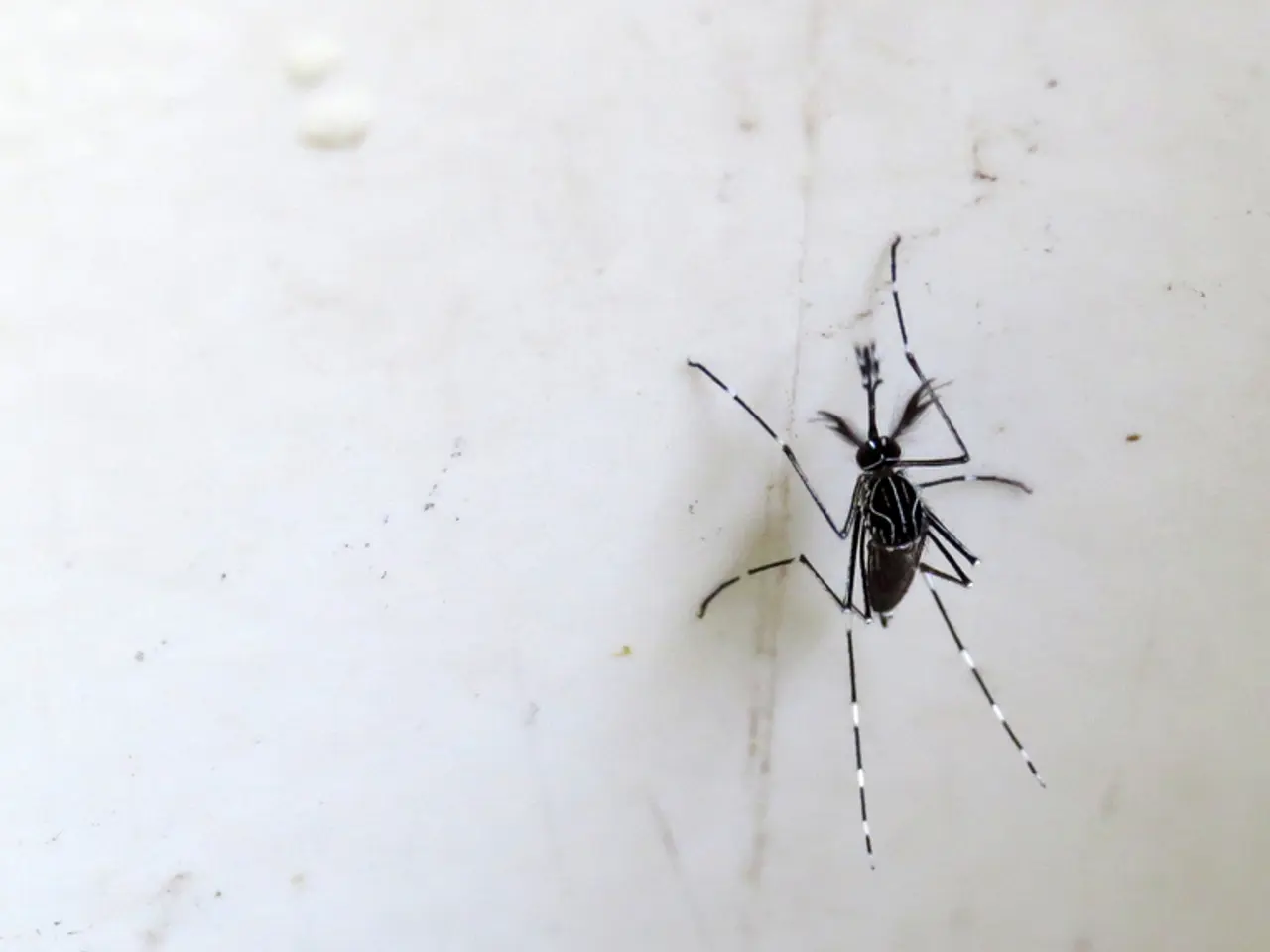Japan's SORA collaboration enters Africa's 12 billion-dollar malaria battle, utilizing AI-driven drones
SORA Technology, a Japanese aerial solutions firm, is set to revolutionize the continent with its AI-powered drones. The company is expanding its operations to 15 African countries, including Nigeria, Ghana, and Sierra Leone, marking a significant stride in the fight against malaria.
SORA Technology's drones are designed for tasks like crop monitoring, pesticide spraying, irrigation, and logistics support. However, in Africa, they will primarily focus on malaria control through Larval Source Management (LSM). This method, which uses drones equipped with AI cameras to scan and map mosquito breeding sites, enables targeted larvicide spraying only where necessary.
This approach reduces insecticide usage by up to 70% and cuts labor and operational costs by around 50%, offering a more sustainable and cost-effective alternative to traditional wide-area spraying methods. SORA Technology's LSM method is part of the $12 billion fight against malaria in Africa, reflecting significant investment potential in this emerging sector.
Africa accounts for over 90% of global malaria cases and deaths, costing African economies an estimated $12 billion annually. SORA Technology's focus on LSM is timely and crucial, as it aims to reach 100,000 people across the continent by year-end.
While SORA Technology shares a common geographic market and involves drone technology, it is positioned more as a collaborator than a direct competitor with Zipline Africa. Zipline Africa operates primarily in rapid, long-range medical delivery using fixed-wing drones from centralized hubs, with a strong presence in Rwanda and Ghana.
Though they share a common geographic market and involve drone technology, SORA and Zipline are positioned more as collaborators than direct competitors, due to differences in operational focus. SORA’s concentration on LSM and integrated local health campaigns versus Zipline’s rapid medical deliveries.
| Aspect | SORA Technology | Zipline Africa | |----------------------|------------------------------------------------|------------------------------------------| | Market focus | AI-powered drone LSM (mosquito breeding site mapping & larvicide spraying) | Medical supply delivery via drones | | Geographic coverage | 15 African countries including Nigeria, Ghana, Sierra Leone | Rwanda, Ghana, and other African nations | | Drone type | Fixed-wing drones with AI imaging cameras | Fixed-wing drones from centralized hubs | | Competitive position | Expanding and complementary to Zipline | Specialized medical delivery focus | | Market size context | Part of $12 billion malaria fight in Africa | Same broad market context but different niche |
This sector is still rapidly evolving, with companies like SORA creating innovative AI-powered solutions for targeted malaria control through drone-based LSM, while Zipline maintains leadership in drone logistics for medical supplies.
SORA Technology plans to sell a malaria-focused drone starting in August and build an assembly plant in Africa. The AI used by SORA Technology for mosquito control includes imaging AI and deep learning. The drone spraying market in Africa is valued at around $100 million. Larvicides are sprayed by SORA Technology's drones only in identified high-risk mosquito breeding sites.
- The technology utilized by SORA Technology in mosquito control is based on imaging AI and deep learning.
- SORA Technology is aiming to reach 100,000 people across Africa by the end of the year.
- The malaria-focused drone by SORA Technology will be introduced in the market starting August.
- The drone spraying market in Africa is estimated to be around $100 million.
- Larvicides are sprayed by SORA Technology's drones only in identified high-risk mosquito breeding sites.
- The assembly plant for SORA Technology's drones will be built in Africa.
- Africa accounts for over 90% of global malaria cases and deaths.
- Malaria costs African economies an estimated $12 billion annually.
- SORA Technology's focus on LSM is timely and crucial.
- SORA Technology's drones are designed for tasks like crop monitoring, pesticide spraying, irrigation, and logistics support.
- This method of mosquito control reduces insecticide usage by up to 70% and cuts labor and operational costs by around 50%.
- SORA Technology's approach to malaria control is part of the $12 billion fight against malaria in Africa.
- SORA Technology is a Japanese aerial solutions firm set to revolutionize the continent with its AI-powered drones.
- In Africa, SORA Technology's drones will primarily focus on malaria control through Larval Source Management (LSM).
- Zipline Africa operates primarily in rapid, long-range medical delivery using fixed-wing drones from centralized hubs.
- Though they share a common geographic market and involve drone technology, SORA and Zipline are positioned more as collaborators than direct competitors.
- SORA’s concentration on LSM and integrated local health campaigns versus Zipline’s rapid medical deliveries.
- Zipline Africa has a strong presence in Rwanda and Ghana.
- The market size of the fight against malaria in Africa is significant, reflecting investment potential in this emerging sector.
- Venture capital, funding, and industry investments may see opportunities in this emerging sector of malaria control.
- Technology solutions in health and wellness, including sleep, mental health, and chronic diseases, are potential areas for venture capital investment.
- Climate change and environmental science may influence technological advancements and investment opportunities in green manufacturing.
- Financial technology (fintech), wealth management, and personal finance are essential areas in theindustry, particularly for emerging markets like Africa.
- Retail, transportation, leadership, diversity, and inclusion are crucial aspects of entrepreneurship.
- Small businesses and startups are integral to a nation's economy and workforce, including aspects such as parenting, weight management, and cardiovascular health.
- As the world becomes more interconnected, investment opportunities may also emerge in sectors like medicine (cancer, respiratory conditions, digestive health, eye-health, hearing), health-and-wellness, fitness-and-exercise, sexual-health, autoimmune-disorders, skin-care, and therapies-and-treatments.
- Nutrition, aging, and women's health are essential areas of focus for improving quality of life and extending longevity.
- Despite its challenges, the energy sector presents investment opportunities in renewable energy sources like solar, wind, and hydroelectric power.
- The space and astronomy industry continues to grow, offering opportunities for innovation and investment in transportation, exploration, and satellite technology.




